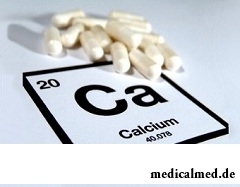





Hypercalcemia
The hypercalcemia is the disease connected with the increase in concentration of calcium in blood reaching the level more than 1,2-1,5 mmol/l of the ionized calcium and more than 3 mmol/l of the general calcium.
Reasons and symptoms of a hypercalcemia
Pathological processes which negatively influence an organism are the reasons of a hypercalcemia, increasing the content of calcium in blood. In some cases the disease is caused by medicines for treatment of a thyroid gland, Burnett's syndrome and malignant new growths. Also diuretics which were accepted systemically for a long time can be the cause of a hypercalcemia.
During the medical researches it was established that this disease arises more often at patients who received medical treatment in a hospital for tiazidama drugs.
If the hypercalcemia has no the expressed symptomatology, then it is confirmed with biochemical researches and clinical inspection.
At the first stage of a disease of symptoms it is not observed, and at further development symptoms from a nervous system, digestive organs and cardiovascular system are shown.
It is possible to carry to the main symptoms of a hypercalcemia:
- from system of digestion – nausea, vomiting, anorexia, a hyperoxemia, a lock;
- from the central nervous system – dizziness, a headache, increased fatigue, drowsiness, coordination loss, confusion of consciousness, a stupor, a coma, psychosis;
- from a musculoskeletal system – a mialgiya, neuralgia, an arthralgia, weakness, muscular spasms;
- from cardiovascular system – a hypertension, heartbeat, arrhythmia, tachycardia.
Medicines, hereditary factors, Pedzhet's disease, excess of vitamin D, malignant tumors and endocrine disturbances can provoke a hypercalcemia.
At an acute hypercalcemia strong weakness, nausea, sharp differences of arterial pressure, block, loss of orientation in space, a stupor and a collapse is observed.
If the disease is not revealed in time and the corresponding treatment is not appointed, then there is a development of an urolithiasis, uric syndrome and pyelonephritis.
Diagnosis of a disease
For identification of a hypercalcemia conduct a number of diagnostic testings, including blood test, the analysis of urine, PTH measurement, a neck ultrasonografiya, an immunoelectrophoresis, a puncture of marrow and radiological inspection of a skeleton.
The analyzed laboratory and chemical results allow to establish the exact diagnosis and to define hypercalcemia degree.
If this disease is followed by development of malignant tumors, then appoint performing full clinical trial with the program of search including a stomach sonografiya, a stsintigrafiya, the roentgenogram and other radiological researches of a skeleton.
Treatment of a hypercalcemia
Treatment of a hypercalcemia has to begin with elimination of causes of illness, including, malignant new growths, the termination of reception of vitamins and reduction of sources of excess intake of calcium in an organism.
Important stage of treatment is recovery of level of extracellular liquid and correction of composition of electrolytes in a blood plasma.
The attending physician can appoint reception of the phosphates reducing the content of calcium, and inhibitors of synthesis of prostaglandins.
The course of treatment of a hypercalcemia can consist of the fixed and additional medicines to which hormonal, antiinflammatory and immunomodulatory drugs belong.
If necessary treatment can have the combined character, and also through a certain interval it is repeated or supplemented with special inhibitors.
There are very curious medical syndromes, for example, persuasive swallowing objects. In a stomach of one patient suffering from this mania 2500 foreign objects were revealed.

Such trouble as the milkwoman's attack, at least once in life happened almost to each woman. Prevalence забол...
Section: Articles about health
Turnip, radish, horse-radish – once these and other products enjoyed wide popularity at our ancestors, being not only the food sating an organism but also the medicines curing of many diseases. Unfortunately, having given the use of some of them...
Section: Articles about health
Vitamin complexes belong to the most popular drugs, probably, in our country there is no person who was not hearing about advantage of vitamins and never their accepting. The more vitamins, the better, we consider and as it appeared, cruelly we are mistaken. Whether vitamins, whether so harmlessly general hobby for polyvitaminic complexes and whether it is possible to do without them are so useful? Let's try to understand....
Section: Articles about health
It is possible to find the extensive range of fruit and vegetables in modern shops. Russians already got used that on counters in any...
Section: Articles about health
Sometimes it seems that modern society was divided into two camps: representatives of the first are sure that only the woman has to be responsible for contraception, representatives of the second, respectively, are sure that it is destiny of men. Meanwhile Dov has a question of contraception...
Section: Articles about health
For most of the working people the problem of having a snack is particularly acute enough. Sooner or later there is a question: what can be eaten quickly between a breakfast and a lunch or a lunch and leaving from service so that to receive necessary power feed, but not to overload an organism with harmful components or excess calories? We bring to your attention the list of products which quite conform to these requirements....
Section: Articles about health
Each of us repeatedly noticed that the people having the same passport age are sometimes not similar on one-years at all. One...
Section: Articles about health
Use of medicinal plants in therapy is urgent today, more than ever. The drugs made of curative herbs cannot replace completely modern synthetic drugs, but their use becomes frequent serious help in simplification a leak...
Section: Articles about health
Many of us, probably, noticed more than once that from intellectual loadings at some point the brain as though "overheats" and "assimilation" of information is strongly slowed down. Especially this problem urgent for persons of age becomes more senior than fifty years. "Already badly I think", "the head will burst now", "memory as if is disconnected" - here that wants to be told at the time of information overload....
Section: Articles about health
It is difficult to revaluate importance of kidneys for an organism. These bodies not only perform work on purification of blood of decomposition products and выв...
Section: Articles about health
What will only not be thought up by persons interested to have a beautiful figure. Here the last innovation – for weight loss needs to be eaten greasy food. Let's understand whether there is at a fatty diet common sense....
Section: Slideshow
Statistically, pathologies of a thyroid gland in the world more than 500 million people have. Failures in work of this body lead to heavy disbolism, development of heart diseases, vessels, a reproductive and nervous system. In hard cases excess or insufficient production of the main hormones of a thyroid gland (thyroxine and triiodothyronine) leads to essential decline in quality of life and disability....
Section: Articles about health
One of the useful properties presented to the person by the nature is ability to feel fear. This ability is called a signal...
Section: Articles about health
It is pleasant to state a possibility of improvement of quality of life of people with problems of functioning of secretory system. Efforts of talented inventors created products which will be able to provide normal life activity of clients with moderate degree for...
Section: Articles about health
Separate food - the system of meal based on digestion physiology which is carried to improvement methods. According to nutritionists, the separate use of the carbohydrate and proteinaceous products demanding different conditions of assimilation helps to get rid of diseases of digestive tract and serves as prophylactic from a diabetes mellitus, arthritis, food allergies, cholelithiasis and many other frustration. The essence of salutary effect of a method consists in most Kacha...
Section: Articles about health
The concept "gluten" (differently, a gluten) combines group of the proteins which are a part of rye, barley and wheat. For most of people упот...
Section: Articles about health
History of cultivation of a buckwheat contains more than five thousand years. Grain which is received from this plant is used for preparation of porridges, soups, baked puddings and puddings, do flour which is one of the main ingredients of the noodles popular in of it...
Section: Articles about health
The kid who was recently born is surrounded with love of adult family members and their cares without which the baby cannot exist. Some parents consider that gentle attachment and caress are quite enough that the child correctly developed and was happy, but it not so. It is important to know as much as possible about specifics of care of the baby, the reasons of his behavior and possible problems. Only the "able to see" love will provide to the little man that it is necessary for him....
Section: Articles about health
According to data of World Health Organization, the cataract is diagnosed almost for 7% of the population of Earth. Statistics we get sick...
Section: Articles about health
The depression not without reason is considered one their main troubles of our century: for scientific and technical progress, acceleration of rate of life and a surplus of information of people it is forced to pay with stresses, negative emotions and weakening of protective forces of an organism. As a result ш...
Section: Articles about health
The climax, or menopause is the normal process of the termination of genital function of the woman which is followed by serious hormonal changes in an organism. Usually the menopause begins at the age of 50-55 years, but characteristics of this process are very individual. Factors of earlier approach of a climax are irregular sex life, numerous abortions, addictions, existence of endocrine, autoimmune and gynecologic diseases, frequent stresses and excessive hobby of diets...
Section: Articles about health
Olive oil – the product capable to make a powerful contribution to health of the person if it includes it in the diet. Rich vitamin...
Section: Articles about health
The advantage of swimming for the person is so high that this sport is not only the most popular, but also is widely applied in medicine and rehabilitation processes. If you look for for yourself the occupation allowing pleasantly and to spend time, then swimming with advantage...
Section: Slideshow
Bathing in broths of medical flowers and plants (phytobathtub) was eurysynusic since Cleopatra who is a good judge in all that concerns beauty and health. And today phytobathtubs is the simple and available means allowing not only to remove nervous tension, but also to recover from many diseases. Grass bathtubs at treatment of cold, osteochondrosis, radiculitis, skin diseases, and also diseases of urinary tract and vessels are especially effective....
Section: Articles about health
The chia plant, or the Spanish sage, is from South America. The indigenous people of the continent since ancient times used in food it семена:...
Section: Articles about health
The state of health of the person in many respects depends on food. The organism will well function if during food it receive only useful substances, necessary vitamins and microelements. In this case there will be no problems with digestion, with лишн...
Section: Articles about health
Tuberculosis – a serious infectious disease which development is caused by mycobacteria (Koch's bacilli). The illness is known from an extreme antiquity. Long time fight against it was considered as ineffective. Quite often the disease affected the whole families, and mortality from it was very high. It became the reason of emergence of a set of delusions concerning transmissibility and a possibility of treatment of tuberculosis....
Section: Articles about health
